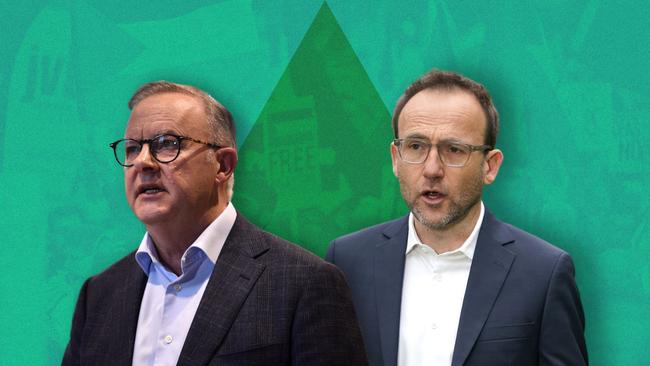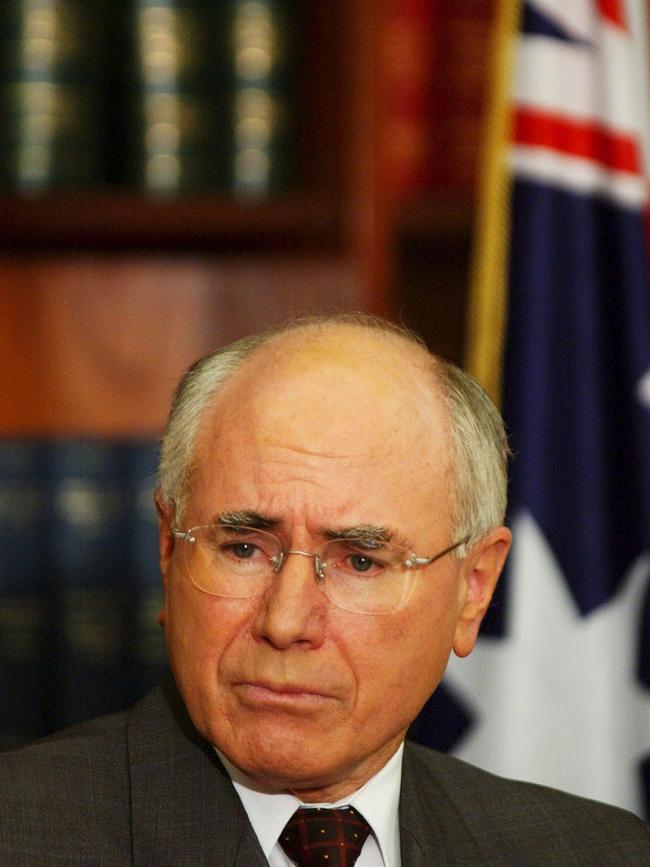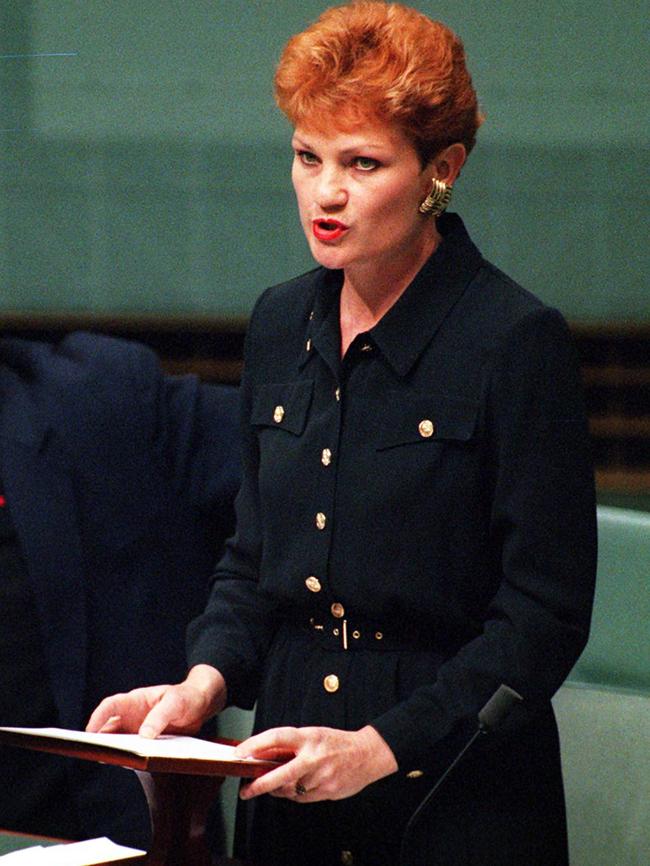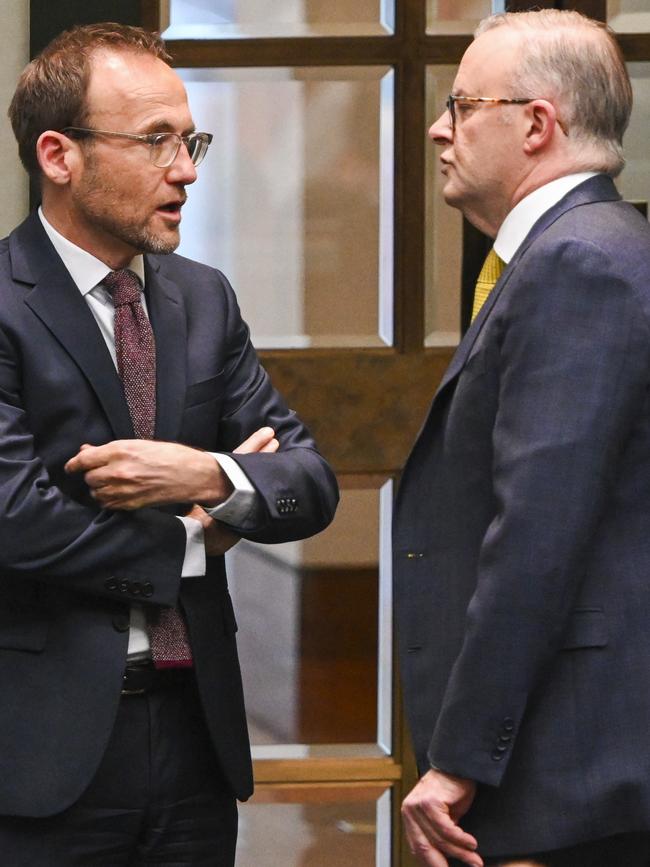
For too long, Labor has failed to deal with the Greens. They’ve run faux campaigns against them in inner-city seats but never run too hard lest they lose support in the Senate. But failing to tackle them with any great force has allowed the Greens to metastasise into a threat not just against Labor as a sensible party of government, in the Hawke-Keating mould, but also to our democracy itself.
The last time there was a major populist breakout, driven by economic stagnation and cultural alienation, it was on the right when Pauline Hanson burst onto the political scene in the late 1990s, declaring that the country was being “swamped” by Asians, among other claims.
Just as the Greens have discombobulated the Albanese government into attacking their policy nostrums as impractical – while actually implementing some version of many of them – the Howard government initially didn’t quite know how to respond to Hanson and, at first, tried to ignore her and to deny the resonance of her message.
Throughout the Howard government’s first term, Labor had been goading it with demands that the Coalition preference One Nation last, in the hope this would provoke a fight between conservatives who thought Hanson was onto something, and progressives who wouldn’t contemplate any genuflection to the “extreme right”.
Howard’s eventual response had both a political and a policy element. Because it was indeed a grave political threat to the Coalition, he did ultimately have the Coalition put One Nation candidates last. But because most One Nation supporters would otherwise have been Coalition voters, he more explicitly repudiated the “republic, reconciliation, refugees” agenda that had characterised the Keating era and that had made some conservatives feel like strangers in their own country.
Plus, he gave his government a sharper political purpose by taking a courageous tax reform platform to the 1998 federal election.

The result was a narrow win to the Coalition, Hanson losing her seat, and no real One Nation threat until a subsequent Coalition leader, Malcolm Turnbull, upset conservatives by being insufficiently different from Labor.
Howard’s strong but sophisticated response to the One Nation challenge not only saw off breakouts on the right for the best part of two decades but meant that when Hanson finally came back, she was the crossbench senator most amenable to working constructively with the Coalition.
For all his initial hesitation, Howard’s decisive final response not only helped the Coalition politically but also helped tame the frustrations of a significant section of the electorate.
Fast forward to the problem of the Greens today. They’re an economically irresponsible, culturally subversive, environmentally extreme and strategically insane party that supports massive additional government spending, illicit drug legalisation, bans on fossil fuels and severe restrictions on agriculture, plus appeasement of Hamas and military disarmament, as seen by the appearance of Greens MPs at Wednesday’s violent protest in Melbourne.
Yet despite this radical agenda, roughly 10 per cent of the population now routinely votes for them: partly because they’re a place to park a protest vote, partly because they’re still seen as basically an environmental party (when they have long moved on from this), and partly because too many people are dabbling with the new Marxist agenda of a social, as well as an economic, revolution.
While the Coalition and the Labor Party argue over what’s the right speed for the so-called green transition, workplace regulation, the proper size of the social safety net, and whether government should be bigger or smaller, the Greens pitch for a radical recasting of society along supposedly fairer and more sustainable lines.

But this makes the two main parties look like tepid managerialists while the Greens seem pure, and values driven. It’s little wonder that young people find the Greens far more visionary and therefore appealing than often compromise-peddling big parties. And from fear of putting people off and losing their preference flows, the big parties are reluctant to explain that a government, which does everything that you want, is a government that will take away everything that you have.
And that the Greens’ policies are a recipe for poverty, anarchy, and surrender to militant competitor nations that would give the West’s political, cultural, racial, religious and sexual minorities very short shrift indeed. A persuasive argument against the Greens’ millennialism, though, would require the kind of passion and conviction that mainstream politicians rarely have and are often reluctant to show.
In the same way that Howard realised that One Nation in its original incarnation would totally discredit mainstream conservatism and therefore had to be electorally destroyed – and an earlier generation of Labor leaders eventually realised that unity tickets with communists were electorally toxic, and that communism had to be utterly rejected – modern Labor needs to go to war with the Greens. It must argue that moderate social democracy will produce a fairer, more sustainable society than utopian radicalism.
It must admit the truth that Australia’s problems are actually relatively minor, which runs counter to modern Labor’s campaigning “crisis” pitch, and that by any realistic comparative measure, our society is still remarkably free, fair, and prosperous. But that’s probably unlikely, especially given the recent dominance of Labor’s Left faction, many of whom are actually Greens in disguise.

Showing that he’s lost none of his political savvy, John Howard has not only recently called on Labor to put the Greens last but he’s also made the same demand of his own party.
Putting the Greens last helped Ted Baillieu’s standing before his surprise Victorian win in 2010.
In fact, Greens MPs are only in parliament because they’ve been preferenced by the Liberals ahead of Labor, even though their positions are utterly hostile to those of the Coalition. It might once have served the Libs’ short-term political interests to embarrass Labor by having its MPs threatened by Greens but, in the longer term, having Greens in the parliament is a scourge for our country.
By declaring that the Greens are a deadly threat to our economic strength, national security and social cohesion – and so will always be put last – the Liberals would demonstrate conviction and courage. And also highlight Anthony Albanese’s weakness given that many Labor MPs only survive on Green preferences.
Dare Labor to put the Greens last and let’s see Albanese for who he really is.







For the sake of our country, the Liberals must put the Greens last at the next election. And for the sake of Labor’s survival as a party able to govern in its own right, Anthony Albanese must go to war against them too, even if the very thought is inimical to his own natural sympathises.